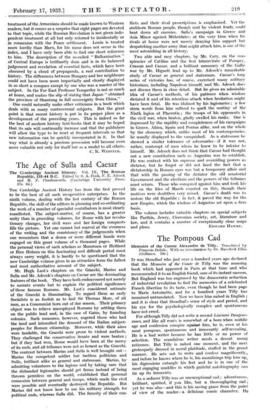The Age of Sulla and Caesar • The Cambridge Ancient History.
Vol IX, The Roman Republic, 133-44 B.C. Edited by S. A. Cook, F. E. Adcock and M. P. Cbarlesworth. (Cambridge University Press. 37s. 6d.)
THE Cambridge Ancient History has from the first proved to be the best of all such co-operative enterprises. In the ninth volume, dealing with the last century of the Roman Republic, the skill of the editors in planning and co-ordinating the work of a number of specialist contributors is most clearly manifested. The subject-matter, of course, has a greater unity than in preceding volumes, for Rome with her revolu- tionary changes, her civil wars and her foreign conquests fills the picture. Yet one cannot but marvel at the evenness of the writing and the consistency of the judgements when one remembers that a dozen or more different hands were engaged on this great volume of a thousand pages. While the personal views of such scholars as Mommsen or Heitland or Rice Holmes on this fascinating and difficult period must always carry weight, it is hardly to be questioned that the new Cambridge volume gives in an attractive form the fullest and most authoritative account of the subject. -
Mr. Hugh Last's chapters on the Graechi, Marius and Sulla and Mr. Adcock's chapters on Caesar are the dominating features of the book. They have both endeavoured not merely to narrate events but to explain the political significance of these famous Romans. Mr. Last's considered estimate of the Gracchi is illuminating. To regard them as early Socialists is as foolish as to hail Sir Thomas More, of all men, as a Communist born out of due season. Their primary object was to relieve unemployed Romans by settling them on the public land and, in the case of Gaius, by founding colonies. Such measures, however, angered those who had the land and intensified the demand of the Italian subject. peoples for Roman citizenship. Moreover, while their aims were laudable, the Gracchi were prone to violent methods. They challenged the conservative Senate and were beaten ; but if they had .won, Rome would have been at the mercy of its mob, and all tribunes were not as honest as the Gracchi. The contrast between Marius and Salta is well brought out— Marius the competent soldier but tactless politician and Sulla, brilliant alike as general and statesman. Marius, by admitting volunteers to the legions and by taking care that the disbanded legionaries should get farms instead of being thrown penniless on the world, established that personal connexion between general and troops, which made the civil wars possible and eventually destroyed the Republic. But Marius did not know how to use his military strength for political ends, whereas Sulla did, The ferocity of their con-
Mats and their rival proscriptions is emphasized. Yet the stubborn Roman people, though rent by violent feuds, could beat down all enemies. Sulla's campaign in Greece and Asia Minor against Mithridates, at the very time when his rivals at home were not merely denying him support but despatching another army that might attack him, is one of the most Astonishing in all history.
Two able and racy chapters, by Mr. Cary, on the con- spiracies of Catiline and the first triumvirate of Pompey, Crassus and Caesar, and a brilliant summary of the Gallic war by Mr. Hignett lead up to Mr. Adcock's remarkable study of Caesar as general and statesman. Caesar's long Series of victories has, of course, exercised many military historians, including Napoleon himself, and Mr. Adcock does not discuss them in close detail. But he gives an admirable idea of Caesar's methods, of his patience when wisdom dictated- it and of his relentless attack when hesitation might have been fatal. He was idolized by his legionaries ; a few stern words from him sufficed to quell the mutiny of the Ninth legion at Placentia ; the troops of his opponents in the civil war, when beaten, gladly swelled his ranks.. One is impressed by the rapidity and completeness of his campaigns in Greece, Africa, Spain and Pontus alike, and on the whole by the clemency which, unlike most of his contemporaries, he usually displayed to the vanquished. As a statesman he showed a similar tolerance of adversaries—if it was not, rather, contempt of men whom he knew to be inferior to himself. Mr. Adcock does not think that Caesar had thought out a new constitution such as Augustus was to establish. He was content with his supreme and overriding powers as dictator, but he forgot or did not heed the fact that is dictatorship in Roman eyes was but a temporary affair and that with the passing of the dictator the old senatorial Government and the elections and the powers of the tribunes must return. Those who conspired against him and took his life on the Ides of March counted on this, though their motives were doubtless very mixed. Caesar's death was to restore the old Republic ; in fact, it paved the way for the new Empire, which the wisdom of Augustus set upon a firm basis.
The volume includes valuable chapters on special subjects like Parthia, Jewry, Ciceronian society, art, literature and Jaw, and it contains a number of exceptionally clear maps






































 Previous page
Previous page